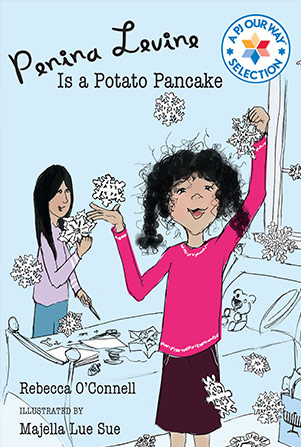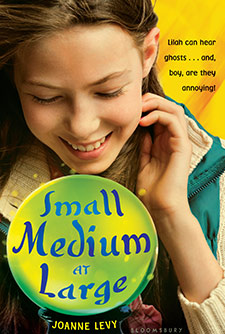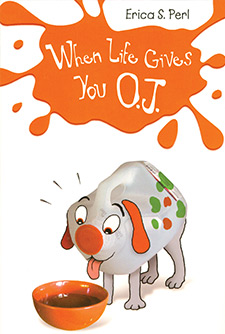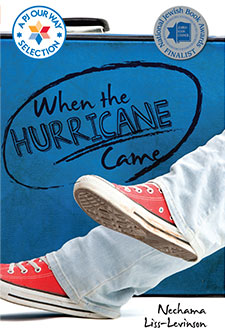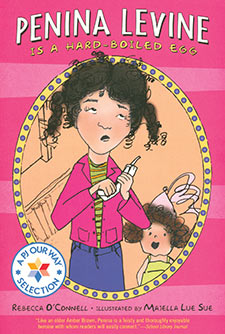Penina Levine is a Potato Pancake
Penina Levine is not looking forward to Hanukkah break. Her annoying sister is driving her crazy, her favorite teacher is leaving, and her best friend is headed out of town. Could it possibly get worse?
Average Rating
( hint: Login to leave a review! )
125 Reviews
Leave Review
What the Book is About
Jewish Content & Values
Positive Role Models
Content Advisory
Talk it Over!
More for You
What the Book is About
Hanukkah break is looking like a disaster for Penina Levine: her best friend is headed to Aruba; her beloved sixth grade teacher is leaving for Tucson, Arizona; and her little sister, Mimsy, is driving her crazy.
Kids will enjoy Penina’s strong pre-teen voice, and they'll laugh with her as she tries hard to become a kinder and more thoughtful friend, sister, and family member.
Jewish Content & Values
- Penina and her family celebrate Hanukkah by exchanging presents, lighting the menorah, eating latkes, and sharing the story of the Maccabees.
- When Mrs. Brown takes a leave of absence to care for her ailing sister, Penina and her friend, Zozo, spend hours creating snowflakes to cheer their teacher and her sister up, practicing Bikkur Cholim (visiting the sick).
Positive Role Models
- At the beginning of the book, we are introduced to a somewhat self-absorbed (but amusing!) Penina as she bickers with her sister, Mimsy; speaks disrespectfully to her parents; and is unable to share in her friend's happiness about her upcoming trip to Aruba. However, as the story progresses, Penina becomes more mature, kinder, and more gracious in her behavior to friends and family.
- Mrs. Brown, Penina’s teacher, leaves her comfortable job and home to care for her sister in another city. She sets a wonderful example for Penina and her friends of putting family first.
- Penina’s mom teaches her complicated mathematical concepts and offers a subtle rebuttal to negative stereotypes about women and math.
Content Advisory
Penina and Zozo enjoy a tasty fritter-frying marathon in this book, but they are cooking with hot oil without supervision.
Talk it Over!
When Penina gets to school, she realizes that she left her shoes at home. Her mom drives to the school and sends Mimsy into Penina’s classroom with the shoes so Penina won’t have to sit in damp boots all day. Mimsy causes a ruckus and, as a result, Mrs. Brown assigns a pop quiz and Penina is extremely embarrassed. Have you ever been embarrassed by a sibling? What tips would you give Penina to improve her relationship with Mimsy?
More for You
“What is Hanukkah?” the Talmud asks (Tractate Shabbat 21b). The cursory answer the rabbis give is that Hanukkah is all about the miracle of the oil – a celebration of the rededication of the Holy Temple. But what about the military victory? Why do the rabbis barely mention the brave Maccabees (Hasmoneans)? There are a few theories as to why the Maccabee victories were omitted from the Talmudic narrative. One of them is that the Talmud was compiled while the Romans were ruling Judea and it might have been dangerous to glorify rebellion at that time. Moreover, some rabbis felt that the essence of the day was best captured by the verse, “Not by might, nor by power, but my Spirit, says the Lord of Hosts,” (Zechariah 4:6), which is read on the Shabbat of Hanukkah.
What the Book is About
What the Book is About
Hanukkah break is looking like a disaster for Penina Levine: her best friend is headed to Aruba; her beloved sixth grade teacher is leaving for Tucson, Arizona; and her little sister, Mimsy, is driving her crazy.
Kids will enjoy Penina’s strong pre-teen voice, and they'll laugh with her as she tries hard to become a kinder and more thoughtful friend, sister, and family member.
Jewish Content & Values
Jewish Content & Values
- Penina and her family celebrate Hanukkah by exchanging presents, lighting the menorah, eating latkes, and sharing the story of the Maccabees.
- When Mrs. Brown takes a leave of absence to care for her ailing sister, Penina and her friend, Zozo, spend hours creating snowflakes to cheer their teacher and her sister up, practicing Bikkur Cholim (visiting the sick).
Positive Role Models
Positive Role Models
- At the beginning of the book, we are introduced to a somewhat self-absorbed (but amusing!) Penina as she bickers with her sister, Mimsy; speaks disrespectfully to her parents; and is unable to share in her friend's happiness about her upcoming trip to Aruba. However, as the story progresses, Penina becomes more mature, kinder, and more gracious in her behavior to friends and family.
- Mrs. Brown, Penina’s teacher, leaves her comfortable job and home to care for her sister in another city. She sets a wonderful example for Penina and her friends of putting family first.
- Penina’s mom teaches her complicated mathematical concepts and offers a subtle rebuttal to negative stereotypes about women and math.
Content Advisory
Content Advisory
Penina and Zozo enjoy a tasty fritter-frying marathon in this book, but they are cooking with hot oil without supervision.
Talk it Over!
Talk it Over!
When Penina gets to school, she realizes that she left her shoes at home. Her mom drives to the school and sends Mimsy into Penina’s classroom with the shoes so Penina won’t have to sit in damp boots all day. Mimsy causes a ruckus and, as a result, Mrs. Brown assigns a pop quiz and Penina is extremely embarrassed. Have you ever been embarrassed by a sibling? What tips would you give Penina to improve her relationship with Mimsy?
More for You
More for You
“What is Hanukkah?” the Talmud asks (Tractate Shabbat 21b). The cursory answer the rabbis give is that Hanukkah is all about the miracle of the oil – a celebration of the rededication of the Holy Temple. But what about the military victory? Why do the rabbis barely mention the brave Maccabees (Hasmoneans)? There are a few theories as to why the Maccabee victories were omitted from the Talmudic narrative. One of them is that the Talmud was compiled while the Romans were ruling Judea and it might have been dangerous to glorify rebellion at that time. Moreover, some rabbis felt that the essence of the day was best captured by the verse, “Not by might, nor by power, but my Spirit, says the Lord of Hosts,” (Zechariah 4:6), which is read on the Shabbat of Hanukkah.

